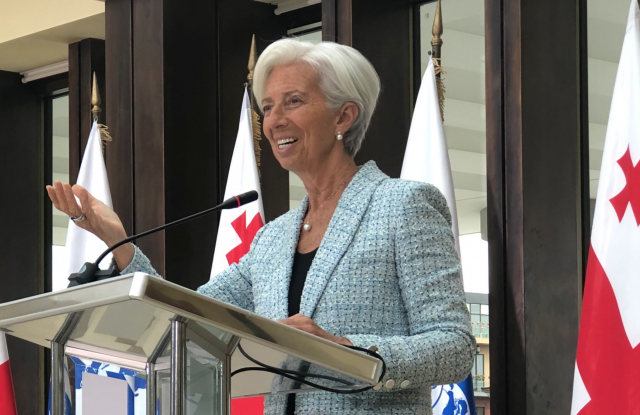IMF Managing Director Visits Georgia
The Managing Director of the International Monetary Fund (IMF), Christine Lagarde, visited Georgia from 19 to 20 May, marking her first visit to the country. During her stay, she met with students and officials to discuss Georgia’s economic development.
On Monday morning, Lagarde visited students in Tbilisi together with the Governor of the National Bank of Georgia Koba Gvenetadze where she spoke about Georgia’s potential to harness reforms to boost inclusive growth.
Lagarde praised developments in Georgia in recent years: “Fiscal deficits are contained, inflation is subdued, banks are well-capitalized, and the unemployment rate has reached a 15-year low,” she said in her speech.
She credited the improvements to a shift in Georgia’s economy from relying on agriculture towards service industries, especially tourism and trade. In addition, Georgia has made “one of the world’s most welcoming business environments,” she stated.
Georgia’s ultimate goal should be to improve living standards to a European level. However, despite the economy’s positive developments, Georgia’s economy is still vulnerable to potential economic shocks from trade tensions and financial market volatility.
“Policymakers can guard against these risks in a comprehensive manner: from maintaining exchange rate flexibility, to further increasing foreign exchange reserves, to implementing prudent economic and financial policies,” she stated.
Another potential issue is Georgia’s reliance on US dollars as many loans and deposits are conducted in dollars. Instead, Georgia should work towards a local capital market, promoting local-currency bonds.
At Georgia’s current long-term GDP growth rate of 5.2%, Lagardze believes that it will take Georgia over 10 years to reach the living standards of emerging European nations. To speed up this progress, she underlined the importance of healthy economic policy, educational and institutional reforms, connectivity, good governance, and the role of Georgia’s younger generation to create a stronger and more inclusive economy.
She also spoke of Georgia’s potential to develop new markets: “Think of the vibrant fashion and music scenes here in Tbilisi,” she said. “Think of the startups that are reshaping the way we manage our finances and run our business, and think of the young Georgian chefs and wine-makers who are attracting global attention.”
However, Georgia is on the right track. “Over the past generation, Georgia has written a remarkable story of transformation,” she said. Over the past twenty years, poverty levels in Georgia have dropped by nearly 75%, real per capita income has almost tripled, and life expectancy has increased by roughly 6%. Nonetheless, high economic inequality means that not everyone has benefited from this growth.
Sustainable and inclusive growth should be a government priority and at the center of their economic reforms, in alignment with the association agreement with the European Union, stated Lagardze. The IMF is also working together with Georgia to build effective policy and offer training. “We remain deeply committed to supporting Georgia’s transformation,” she promised.
She ended her speech with a quote from Georgian poet, Ilia Chavchavadze: “A man creates his own destiny, but destiny does not create a man.” By working towards a resilient and inclusive economy, Georgia can improve the economic situation not just on the short-term, but for future generations as well.











